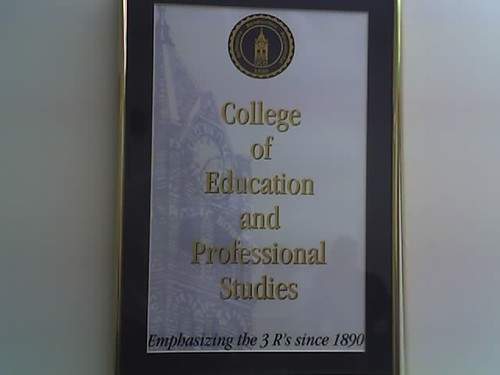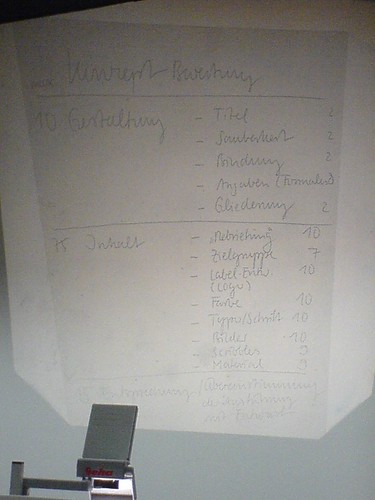This sign caught my eye this morning as I was visiting an Oklahoma university:
I am not posting this photo and commenting on it to put down or slight this university or department in any way. What I am writing here is not directly critical of them, their faculty or their learning environment. My reflections focus on the words found at the bottom of this sign, which I suspect is the defacto slogan of many other learning environments across our nation at the present time:
Emphasizing the 3 R’s since 1890.
I think this slogan probably resonates with a lot of older adults, because a “focus on the basics” message for education makes sense and sounds appealing to many. Certainly the ability to read, write, and perform basic arithmetic are foundational skills all learners need.
Today, however, I think our educational need is more pressing than ever to GO BEYOND “the basics.” Focusing on “the 3 R’s” was laudable in the 19th century when access to information was sharply limited and being “literate” in some contexts meant being able to just write your name. Today in the knowledge landscape of the 21st century, however, an exclusive emphasis on the 3 R’s is like an advertisement for irrelevance.
Non-digital, 19th century learning environments PREDOMINATE in most of our schools– at least where I live and work most of the time in Oklahoma. I had a conversation with a preservice teacher today who recently had some “field experiences” with a high school government and history teacher. I asked him what types of technology applications the teacher was using with students, and his answer was: An overhead projector.
We’re living in a remarkably dynamic time for learning and living, and it shouldn’t surprise us that so many people (and institutions) are slow to change. Like John Miller shared last week, when we seek to change perceptions and paradigms of thinking it is best NOT to ask people, “Do you want to change your culture?” The answer to that question will almost always be “No!” Instead, I agree that we should focus on goals and shared learning objectives.
A friend talked to me about this yesterday in the context of the book “Parenting With Love And Logic.” When asked about their parenting goals, some parents will respond “to have healthy and happy children.” Yet our goal as parents shouldn’t just focus on where our children are TODAY, but also on where we want them to be (developmentally and cognatively) in the future. A better parenting goal, with a vision for the future as well as the present, might be “To raise children that will grow up to be capable, responsible, and ethical adults.”
Similarly in education, I think we need to evaluate the stated GOALS we are striving to achieve, and recognize our children need and deserve far more than preparatory experiences focused on “The 3 R’s.”
Technorati Tags: education, educationreform, leadership, learning, literacy, school2.0, schoolreform



Comments
5 responses to “More than the 3 R’s?”
I agree whole heartedly. It saddens and infuriates me that education is so very slow. And the days I am fed up are the days when I fall back into the old ways. No, mine is not a 21st century classroom, but at least I am trying to move in that direction. But I am rebuffed over and over, even by the kids who have ‘old school’ expectations. We are blogging, we are podcasting, we are using technology in our classroom but these are still incidentals. They make for a great day or week but I still haven’t really figured out how to integrate. How to make it seamless to use technology, how to be more of an encourager and less of a (strike out dragon lady)
traditionalist. There is too much talk of new curriculum, assessment, rubrics, reporting, accountability, testing. Yes, all of these have their place but we need to be concentrating on the kids, their thinking, communicating, interests, knowledge. Now the emphasis is on oral language, speaking. But what about listening with purpose. Thanks for a forum to vent. Enjoy your blog. Oh, and the addition to the Bloom’s Taxonomy (create) makes ever so much sense. val
The basic need is to make the parents aware about it.
Concentrate on the kids, their thinking, communicating,knowledge
Wes, I agree with the main point of your post here– that the “Three R’s” are a necessary but not sufficient set of skills for the modern student — but I disagree with the sentiment here that old = bad and new = good. (For example, using phrase “19th century learning environments” as referring in and of itself something bad in the article, and “21st century classroom” in the comment above as inherently positive.) The mere presence of high technology in a classroom does not imply anything about the quality of learning that’s going on, nor does its absence.
Just the fact that the teacher to whom you referred was using an overhead projector, and nothing more, doesn’t mean that his/her teaching would be improved by something more modern. It may well not have been. I taught a precalculus class a week or so ago where we made good use of the overhead, drawing the data plot on one slide and then overlaying the graph of the line of best fit on another. The extent and type of technology used in a classroom must be a function of what works best. There can be situations where having no electronic (or even electrical) technology around provides the optimum environment for learning. You just never know — it has to be the teacher’s call, based on what s/he has learned about the students.
I agree with you Robert, in that we don’t want to demonize or otherwise put down teachers who aren’t using digital tools as being “bad teachers” or using “bad methods.” The best teachers I had growing up weren’t great because they used the technology of the day, which was the filmstrip projector and the overhead projector. (Maybe a 16mm film from time to time.) That said, however, I don’t think we can permit our schools to retain 19th century instructional models on a broad basis. We have faith in the traditional, teacher lecture model of education because we are so steeped in it. Most people today don’t have extensive experiences with blended learning, even if they are young. So I think we need to be looking for the right tools that create the sort of learning interactions we want in educational contexts. You are correct that sometimes, the best environment involves zero electronic/digital tool use. I think generally, however, blending our learning with different tools can produce the best options for learning.